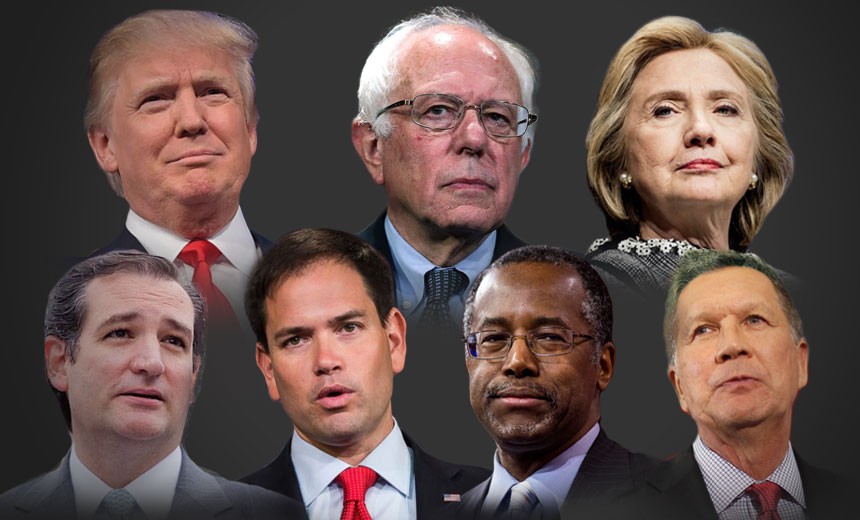Cybersecurity , Privacy , Risk Management
None Unequivocally Backs Apple in Privacy-Security Spat with the Government Clockwise from top left: Donald Trump, Bernie Sanders, Hillary Clinton, John Kasich, Ben Carson, Marco Rubio and Ted Cruz.
Clockwise from top left: Donald Trump, Bernie Sanders, Hillary Clinton, John Kasich, Ben Carson, Marco Rubio and Ted Cruz.None of the major presidential candidates unequivocally backs Apple in its privacy vs. security battle with the U.S. government over its refusal to help the FBI crack the password of the iPhone of one of the San Bernardino, Calif., shooters.
See Also: Former NSA Technical Director on Threat Intelligence
But three of the candidates - Republican Marco Rubio and Democrats Hillary Clinton and Bernie Sanders - admit that they're conflicted over the matter, calling for Apple and the government to find an amenable resolution.
These candidates concede valuable information might be found on the shooter's iPhone that could help officials prevent future crimes and attacks. Sen. Rubio of Florida, who says he hopes Apple will assist the FBI, also says the related issue of creating an encryption backdoor needs careful study. "There has to be a way to deal with this issue that continues to protect the privacy of Americans but creates some process by which law enforcement and intelligence agencies can access encrypted information," says Rubio, voicing a nuanced view similar to former Secretary of State Clinton and Sen. Sanders of Vermont. "I don't have a magic solution for it today. It's complicated."
Former Secretary of State Hillary Clinton
Audio from MSNBC/Telemundo-sponsored town hallSen. Marco Rubio, R-Fla.
Audio from CNN-sponsored town hallSen. Bernie Sanders, ID-Vt.
Audio from MSNBC/Telemundo-sponsored town hallThe four other major contenders - Republicans Donald Trump, Ted Cruz, John Kasich and Ben Carson - say the government should compel Apple to help the FBI, though all - to various degrees - understand Apple's position of wanting to help protect customers' privacy.
"I think Apple has serious argument that they should not be forced to put a backdoor in every cell phone everyone has," says Cruz, a U.S. senator from Texas. "But I think law enforcement has the better argument; this concerns the phone of one of the San Bernardino (attackers)."
Still, Trump offered a harsh criticism of Apple in a Feb. 17 televised town hall on MSNBC , when he said it was "disgraceful" that Apple hadn't helped authorities crack open the iPhone.
Retired Neurosurgeon Ben Carson
Audio from CNN-sponsored town hallSen. Ted Cruz, R-Texas
Audio from CNN-sponsored town hallGov. John Kasich, R-Ohio
Audio from Fox News debate/Reuters TV news report
Developer Donald Trump
Audio from MSNBC-sponsored town hall/Trump rallyThe Justice Department is seeking a judicial order to compel Apple to assist the FBI in opening the iPhone 5C used by Syed Rizwan Farook, who along with his wife Tafsheen Malik in December killed 14 of his colleagues at the Inland Regional Center, where he worked (see Apple, FBI Escalate Crypto Fight). Authorities recovered the iPhone used by Farook, but owned by his employer, San Bernardino County, following a shootout with police in which Farook and Malik died.

